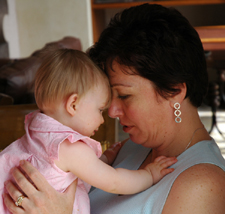Bonnie Summers, MA, LMFT, BCPCC
|
|
Counseling| Marriage | > Parenting
| Women's Issues
|
NURTURING OUR CHILDREN’S SELF-ESTEEM
By Bonnie Summers, M.A., LMFT
What do we mean when we refer to self-esteem? According to Dorothy Corkville Briggs, author of “Your Child’s Self Esteem,” it is how a person feels about himself. It is his over-all judgment of himself…how much he likes his particular person. High self-esteem is not a noisy conceit. It is a quiet sense of self-respect, a feeling of self-worth. When you have it deep inside, you’re glad you’re you. Conceit is but whitewash to cover low self-esteem. With high self-esteem you don’t waste time and energy impressing others; you already know you have value. In addition, according to Robert Reasoner, self-esteem refers to the sense of self-respect, confidence, identity, and purpose found in an individual. Individuals with high self-esteem demonstrate a high degree of acceptance of self and others. |
|
Self-esteem is based on the convictions that one is lovable and capable. These beliefs are developed through our experiences in relationships with people we love and depend on. It is in our families that we have the potential to develop and nurture healthy self-esteem.
According to Dorothy Corkville-Briggs, parents serve as their children’s first and most powerful mirrors. It is through our eyes, our words and our reactions, that children experience who they are as unique human beings. Children do not question our expectations; they experience their ability to measure up. Their sense of identity, value, competence, and self-worth are shaped by our interactions with them. We are their nurturers, teachers, and champions. The parent-child relationship is the foundation for our children’s emotional well-being.
As parents we have a lot of influence with our children and a lot of responsibility to help foster and nurture their self-esteem. In general, according to the book “Parenting Young Children” (Dinkmeyer & McKay), there are two main ways that we can help build self-esteem during the early years with our children: by showing respect and by encouragement. When we show respect, we model respect. We respect ourselves and treat our children with respect. How do we help our children learn respect? We are considerate, we appreciate what’s special, we support our children’s interests, we give choices, we help our children learn from mistakes, and we show respect for ourselves.
How do we learn to use encouragement? Our divine example here is Jesus. In I Thessalonians 5:11 it reads, “Therefore encourage one another and build each other up.” Encouragement helps children learn to believe in themselves. It teaches them to find their own strengths and special qualities. When we encourage our children, we love and accept them, we have faith in them, we notice effort and improvement, and we appreciate them.
Self-esteem is vital in the development of our children and necessary for healthy adult living. As we begin to use the skills of respect and encouragement with our children, we can expect to see their self-esteem blossom.
15 Ways To Help Children Like Themselves
1. Encourage children. Give praise, recognition, a special privilege or increased responsibility for a job well done. Emphasize the good things they do, not the bad.
2. Take their ideas, emotions and feelings seriously. Don’t belittle them by saying, “You’ll grow out of it.” or “It’s not as bad as you think.”
3. Define limits and rules clearly, and enforce them. But do allow leeway for your children within these limits.
4. Be a good role model. Let your children know that you feel good about yourself. Also let them see that you too can make mistakes and can learn from them.
5. Teach your children how to deal with time and money. Help them spend time wisely and budget their money.
6. Have reasonable expectations for your children. Help them to set reachable goals so they can achieve success.
7. Help your children develop tolerance toward those with different values, backgrounds and norms. Point out other people’s strengths.
8. Give your children responsibility. They will feel useful and valued.
9. Be available.
10. Give support when children need it.
11. Show them that what they do is important to you. Talk with them about their activities and interests. Go to their games, parents’ day at school, drama presentations, and award ceremonies.
12. Spend time together. Share favorite activities.
13. Discuss problems without placing blame or commenting on a child’s character. If children know that there is a problem but don’t feel attacked, they are more likely to help look for a solution.
14. Use phrases that build self-esteem such as “Thank you for helping” or “That was an excellent idea.” Avoid phrases that hurt self-esteem: “Why are you so stupid?” or “How many times have I told you?”
15. Show how much you care about them. Hug them. Tell them they are terrific and that you love them.
Source-Unknown

